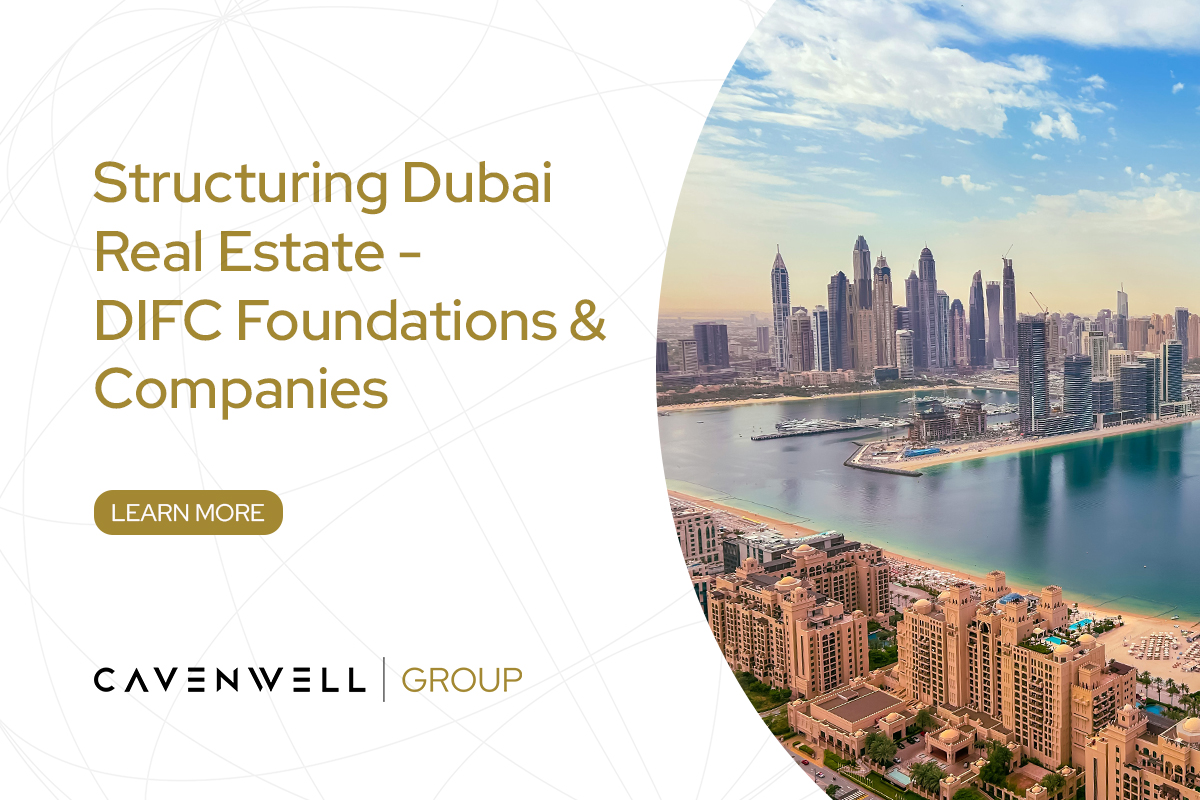Introduction
Dubai’s real estate market continues to grow at an impressive pace, attracting investors from around the world. As the market matures, the need for effective and strategic structuring of property holdings becomes increasingly important. One of the most effective ways to manage these holdings is through the use of DIFC Foundations and Dubai Property Holding Companies. These structures offer numerous advantages, from asset protection and privacy to succession planning and tax efficiency.
This article explores the benefits of structuring Dubai property holdings through DIFC Foundations and Property Holding Companies, offering a detailed guide for investors looking to safeguard their assets and optimise their real estate investments.
The Growth of Dubai’s Real Estate Market
Dubai’s real estate market has seen tremendous growth, cementing its position as a global hub for property investment. As of 2024 year-on-year price increases of around 20% and over 22% for villas which are in high demand.
A Bloomberg report recently highlighted that Dubai offers excellent value for money compared to other global cities such as London and New York. This competitive edge, combined with Dubai’s strategic location and favorable tax regime, has made it a prime destination for high-net-worth individuals and institutional investors alike. As the market continues to thrive, there is an increasing demand for sophisticated structures that can manage and protect these high-value assets.
Why Structure Property Holdings with DIFC Foundations and Dubai Property Holding Companies?
Asset Protection with DIFC Foundations
One of the most compelling reasons to structure property holdings through a DIFC Foundation is the robust asset protection it offers. By isolating assets within a foundation, investors can effectively shield their real estate from litigation and creditor claims. This form of ring-fencing ensures that in the event of personal financial difficulties or legal disputes, the property held within the foundation remains secure and insulated from external risks. This level of protection is especially critical in today’s litigious environment, where safeguarding assets from potential threats is paramount, evermore so for entrepreneurial clients.
Enhancing Privacy with Dubai Property Holding Companies
Privacy concerns are a significant consideration for many investors in Dubai’s real estate market. Property transactions are recorded in centralised registers, making ownership details accessible to certain third parties. For clients who value discretion, holding property through a Dubai Property Holding Company or a DIFC Foundation can provide the necessary privacy. By structuring ownership in this way, the central record reflects the corporate entity rather than the individual’s name. This is particularly advantageous when renting out properties, as the corporate entity’s details can be shared with tenants and authorities (e.g., during Ejari registration) instead of the owner’s personal information. This approach not only enhances privacy but also helps to maintain a layer of discretion in dealings related to the property for discerning individuals.
Succession Planning with DIFC Foundations
DIFC Foundations offer significant benefits in terms of succession planning, providing a flexible and secure method for managing the distribution of assets. Unlike traditional wills, which may be subject to probate and the application of Sharia law, a DIFC Foundation allows for the seamless and controlled transfer of property according to the founder’s exact wishes. This ensures that heirs receive their inheritance without delays, disputes, or legal challenges. Additionally, the foundation can continue to operate beyond the founder’s lifetime, providing ongoing management and protection of the assets according to the established bylaws. This feature is particularly attractive to investors looking to ensure the longevity of their real estate holdings and the smooth transition of assets to future generations.
Key Benefits of Using DIFC Foundations for Dubai Property Holdings
Flexible Legal Framework of DIFC Foundations
A significant advantage of using a DIFC Foundation is the flexibility it offers in its legal framework. The foundation’s charter and bylaws can be tailored to meet the specific needs of the founder, allowing for a high degree of customisation. This flexibility is particularly valuable for estate planning, as it enables both Muslim and non-Muslim investors to align the management and ongoing distribution of assets with their personal or religious preferences. For example, while Sharia inheritance rules may dictate a certain distribution upon death, the foundation’s bylaws can be drafted to reflect alternative approaches, ensuring the founder’s wishes are honored. Equally, the foundation’s bylaws can be drafted to ensure any distributions, whether during the founders lifetime or after their death, reflect sharia inheritance rules. This legal adaptability makes DIFC Foundations a preferred choice for investors seeking to manage their real estate holdings according to precise and personalised guidelines.
Privacy in Dubai Property Holding
Privacy remains a key concern for many property investors, especially those managing high-value assets. DIFC Foundations offer a high level of privacy by ensuring that the founder’s identity is not disclosed in public records. Instead, the foundation itself is listed as the owner of the property, providing a layer of discretion that is particularly beneficial in the context of Dubai’s property market. This structure not only protects the investor’s personal information from identity fraud risk but also reduces the risk of unwarranted attention from third parties. Moreover, when properties are rented out, the foundation’s details, rather than the individual’s, are shared in rental agreements and other official documentation, further enhancing privacy.
Succession Planning through DIFC Foundations
Succession planning is a critical aspect of wealth management, and DIFC Foundations excel in this area by offering a robust framework for the transfer of assets. Unlike traditional wills, which may be subject to probate and the application of Sharia law, a DIFC Foundation allows for the seamless and controlled transfer of property according to the founder’s exact wishes. This ensures that heirs receive their inheritance without delays. Additionally, the foundation can continue to operate beyond the founder’s lifetime, providing ongoing management and protection of the assets according to the established bylaws. This feature is particularly attractive to investors looking to ensure the longevity of their real estate holdings and the smooth transition of assets to future generations.
Strategic Use of DIFC Foundations with Dubai Property Holding Companies in Freezones
Combining DIFC Foundations with Freezone Property Holding Companies
For investors with commercial properties located in Freezones such as the Dubai Multi Commodities Centre (DMCC) or the Dubai International Financial Centre (DIFC), combining a DIFC Foundation with a Freezone Property Holding Company can offer significant advantages. Due to property registration restrictions, it is often most efficient to establish a holding company within the specific Freezone where the commercial property is located. For example, a commercial property in the DMCC can be acquired through a DMCC Property Holding Company, which is then owned by a DIFC Foundation. This combination allows investors to benefit from the tax efficiencies and asset protection provided by the foundation while complying with the property registration requirements of the Freezone.
Tax Efficiency through DIFC Foundations and Property Holding Companies
Tax efficiency is a crucial consideration for non-resident investors holding property in Dubai. While Dubai itself does not levy taxes on income or capital gains from real estate holdings held personally, the investor’s country of residence may impose such taxes. By structuring property holdings through a DIFC Foundation or a Freezone Property Holding Company, investors may achieve greater tax efficiency. For instance, the recent amendments in the UAE’s corporate tax law include provisions to prevent the punitive impact of corporate tax on individuals who use foundations for wealth planning. The foundation can elect to be treated as fiscally transparent, ensuring that any tax liabilities are aligned with the investor’s overall tax strategy, potentially reducing the tax burden.
Structured Financing and Collateralisation
Investors with a portfolio of properties held within a DIFC Foundation or a Dubai Property Holding Company can leverage their assets for structured financing. By using the property portfolio as collateral, investors can secure equity release financing or other forms of credit, enabling them to unlock the value of their assets without having to sell them. This approach is particularly useful for investors looking to reinvest in additional properties or other ventures while maintaining ownership of their existing assets. The ability to use a well-structured property holding as collateral further underscores the financial flexibility offered by DIFC Foundations and Property Holding Companies.
Legal and Regulatory Considerations for DIFC Foundations and Dubai Property Holding Companies
Corporate Tax Law and DIFC Foundations
The UAE’s recent corporate tax law amendments have introduced several provisions that are particularly relevant to DIFC Foundations and Dubai Property Holding Companies. One key provision is the ability for a foundation to elect fiscal transparency, which can prevent the imposition of corporate tax at the foundation level. These amendments are designed to encourage the use of foundations for wealth planning, ensuring that they remain a viable and attractive option for structuring Dubai property holdings.
Compliance Requirements for Dubai Property Holding Companies
Setting up and maintaining a DIFC Foundation or a Dubai Property Holding Company involves adhering to a range of legal and regulatory requirements. These include the initial registration of the entity, the drafting of charter and bylaws, the appointment of an approved DIFC registered agent such as Cavenwell and ongoing compliance with reporting obligations. It is crucial for investors to work closely with legal and tax advisors to ensure that their property holding structures comply with both UAE law and international regulations. Failure to meet these requirements can result in penalties or the loss of the legal protections afforded by the foundation or holding company.
Conclusion: The Future of Dubai Real Estate Structuring with DIFC Foundations
Dubai’s real estate market is thriving, and as it continues to mature, the methods for structuring property holdings are becoming increasingly sophisticated. DIFC Foundations and Dubai Property Holding Companies offer a range of benefits that are essential for modern investors, including asset protection, privacy, succession planning, and tax efficiency. As more investors recognise these advantages, the use of foundations and holding companies is likely to become even more prevalent. For those looking to optimise their real estate investments in Dubai, these structures provide the ideal solution for managing and protecting valuable assets in a dynamic and competitive market.
As a DIFC registered corporate services provider, Cavenwell has a depth of expertise in establishing these structures and providing an end-to-end service, assisting clients with obtaining suitable 3rd party tax and legal advisors.
FAQs
-
What is a DIFC Foundation and how does it work for Dubai property holding?
A DIFC Foundation is a legal entity established in the Dubai International Financial Centre (DIFC) that allows individuals and businesses to hold and manage assets, including real estate, under a structured legal framework. It offers benefits such as asset protection, privacy, and flexibility in succession planning, making it an attractive option for property holding in Dubai.
-
How does a DIFC Foundation protect my assets in Dubai?
A DIFC Foundation protects your assets by ring-fencing them within the foundation, making them legally separate from your personal estate. This structure safeguards your assets from potential litigation, creditor claims, and other financial risks, ensuring that your property remains secure even in challenging circumstances.
-
Can a DIFC Foundation be combined with other entities like Freezone companies?
Yes, a DIFC Foundation can be strategically combined with Freezone Property Holding Companies. For example, if you own commercial property in a Freezone like the DMCC, you can establish a holding company within that Freezone and have it owned by a DIFC Foundation. This setup allows you to benefit from both the legal protections of the DIFC Foundation and the regulatory advantages of the Freezone. It is also possible to establish a DIFC Prescribed Company as a subsidiary to the DIFC Foundation.
-
What are the tax implications of using DIFC Foundations for Dubai property holdings?
While Dubai itself does not impose taxes on income or capital gains from real estate held personally, your country of residence may. By using a DIFC Foundation, you can potentially achieve greater tax efficiency. The UAE’s corporate tax laws also offer provisions for DIFC Foundations to elect fiscal transparency, ensuring that any tax liabilities are aligned with your overall tax strategy. It is important to obtain appropriate tax advice when establishing such structures.
-
How do I set up a DIFC Foundation or a Dubai Property Holding Company?
To set up a DIFC Foundation or a Dubai Property Holding Company, you will need to follow specific legal and regulatory steps, including registration, drafting of the foundation’s charter and bylaws, and ongoing compliance with reporting obligations. As a DIFC registered Corporate Services Provider, Cavenwell Group can assist with implementing your desired structure.
-
Can Cavenwell assist with the ongoing management and compliance of a DIFC Foundation or Property Holding Company?
Yes, Cavenwell provides ongoing management and compliance services for DIFC Foundations and Property Holding Companies. This includes annual filings, updates to foundation charters and bylaws, and ensuring that your entity remains in good standing with the DIFC authorities. Our proactive approach to compliance helps you focus on your investment strategy while we handle the regulatory aspects of managing your foundation or company.
The content of this article is intended to provide a general guide to the subject matter. Specialist advice should be sought about your specific circumstances.


